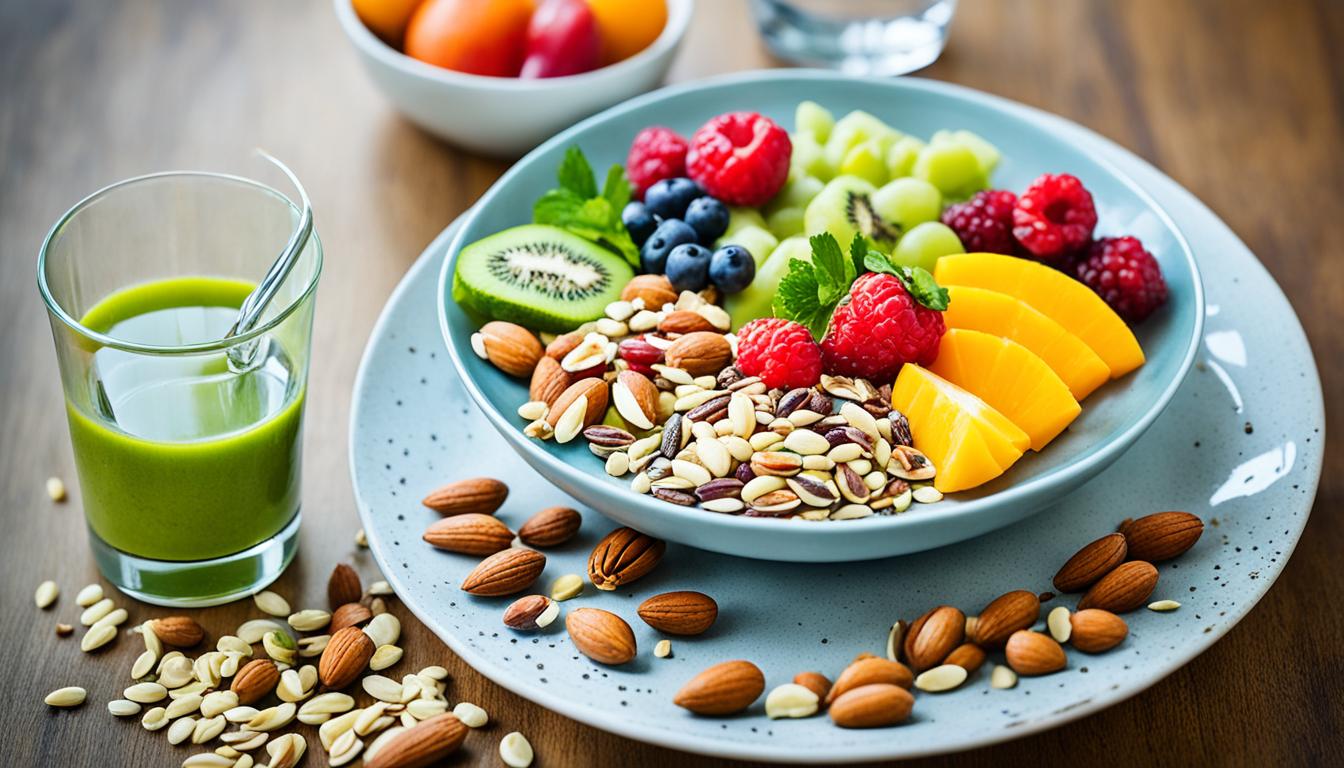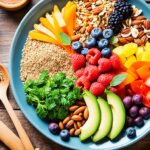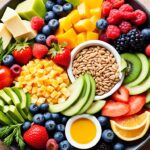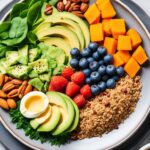Ever felt like your body’s against you? I sure did when I learned I had polycystic ovary syndrome (PCOS). There was the endless symptoms, the hard weight loss, and the tough hormonal balance. Everything made me feel like I was losing a battle I couldn’t win.
Then, a PCOS-friendly diet changed everything for me. Through small diet adjustments and choosing the right foods, I found balance. It was like finally taking charge of my own health.
A PCOS-friendly diet did more than just manage my symptoms. It boosted my well-being in ways I never imagined. It’s all about the powerful impact the right foods can have on us, body and mind.
If PCOS has you down, know there’s hope. You’re not alone in this fight. We can tackle the challenges together and discover the road to better health.
Key Takeaways:
- PCOS-Friendly diet tips can help manage symptoms and improve overall well-being.
- Small changes to eating habits and incorporating the right foods are key
- A PCOS-friendly diet can provide balance and control over symptoms.
- Don’t give up—there is hope and support available.
- We can navigate this journey together.
The Importance of Diet for PCOS
Many with PCOS, about 50% to 75%, face insulin resistance. Insulin manages blood sugar levels. But, in cases of resistance, cells don’t absorb glucose well. This leads to high blood sugar and a higher chance of diabetes. A healthy weight is key, which begins with the right diet and exercise. A diet tailored for PCOS can balance hormones, fight insulin resistance, and boost health.
Choosing the right foods can help manage PCOS. Adding certain foods to your meals can tackle hormone imbalances. It supports your body’s fight for better health.
Stick to a diet full of whole foods for good results. This means eating lots of vegetables, lean proteins, whole grains, and healthy fats. Picking the right foods gives your body essential nutrients. This can help lower PCOS symptoms.
Fighting insulin resistance is central in a PCOS diet. It’s a big part of PCOS and can spike your blood sugar, upping your diabetes risk. Go for foods with a low glycemic index. These foods slowly release glucose into your blood. It helps you keep your blood sugar in check and tackles insulin resistance.
Focusing on foods that balance hormones is also vital. Eat foods packed with omega-3 fatty acids. They’re in fish like salmon, sardines, and trout, and seeds like flaxseed and chia. Omega-3s help manage hormones, lower inflammation, and boost how your body deals with insulin.
Eating whole, unprocessed foods should be your goal. Steer clear of processed stuff, sweet snacks, and sugary drinks. These foods can worsen insulin resistance and inflammation. Instead, choose whole grains, fruits, and vegetables. They’re filled with the nutrients your body needs.
It’s not just about what you eat. Watching your portions and when you eat is crucial for PCOS management. Have balanced meals and snacks throughout the day to keep your blood sugar steady. Don’t forget about exercise, like cardio and strength training, for weight control and to help your body use insulin better.
Foods to Avoid with PCOS
Managing PCOS through diet is key. Be wary of certain foods that can make PCOS symptoms worse. They can also up the risk for other issues. By steering clear of these items, we help keep our health in check. Let’s take a look at what to avoid.
- Fried foods: These are often full of bad fats. They can make inflammation and weight gain worse. Try healthier cooking methods instead, like baking or grilling.
- Saturated fats: Foods rich in saturated fats can boost inflammation. This includes meals with a lot of red meat and full-fat dairy. Go for lean proteins and low-fat dairy to keep inflammation down.
- Processed snacks: Snacks such as chips and cookies come with a bunch of sugars and bad fats. Stick to healthier snacks like fruits or nuts to avoid these issues.
- Sugary beverages: Drinks like sodas and energy drinks hide tons of sugar. They offer no real nutrients and can lead to weight gain. Drink more water or unsweetened tea for better health.
- Alcoholic beverages: Alcohol messes with hormones and can add to your waistline. Those with PCOS should cut back or skip alcohol entirely.
- Refined flour: Foods that use white flour can mess with blood sugar levels. Try whole grains to keep your sugar steady.
- White rice: White rice is quick to raise blood sugar. Try whole grain choices like quinoa or brown rice for a better option.
- Sugary cereals: Even many “healthy” cereals are full of sugar. Look for cereals with whole grains and little added sugar. Or try oatmeal or yogurt with fruit for breakfast.
Avoiding these foods is part of taking care of your health with PCOS. Making healthier food choices can help balance hormones and deal with symptoms. It’s a great way to support your well-being.

Best Foods for PCOS
Eating the right foods can really help with PCOS. It makes symptoms better and keeps your health in check. Here are some great foods to try:
- Omega-3 rich fish: Add fish like salmon and sardines to your meals. They bring omega-3 fatty acids that can reduce inflammation. They also help your hormones stay balanced.
- Olive oil: Choose olive oil for cooking over other saturated fats. It’s full of good monounsaturated fats. These fats can help make your body more sensitive to insulin.
- Beans and legumes: Beans and legumes are a great plant-based protein. They’re also full of fiber and complex carbs. They keep your blood sugar levels steady with their low glycemic index.
- Non-starchy vegetables: Your plate should be colorful with veggies like broccoli and bell peppers. These veggies are a great source of fiber and vitamins. They also have antioxidants for better health.
- Whole grains: Go for quinoa and whole wheat instead of refined grains. These whole grains are rich in fiber and nutrients. They help control blood sugar and lower insulin resistance.
- Whole fruits: Eat fruits like berries and apples for a sweet treat. They’re full of natural sugars, fiber, and antioxidants. This makes them a better choice than sugary snacks.
Add these foods to your meals to help with PCOS. They keep your hormones in balance, improve insulin resistance, and boost your health.
The Role of Fad Diets
Fad diets might look like an easy way to handle PCOS and lose weight. But, it’s better to be cautious and pick plans that are good for your health in the long run. Focus on changes that will keep you healthy over time.
It’s not smart to cut out whole food groups, especially carbs, for managing PCOS. Instead, go for a diet that’s balanced and includes all the nutrients you need. Pick carbs that are low-glycemic, like whole grains and veggies, to keep your blood sugar steady and make you feel full.
Eating smaller meals more often is also good for people with PCOS. This keeps your energy and blood sugar levels balanced. Snacks that are healthy and balanced between meals can keep your blood sugar even and stop you from getting too hungry.

If you focus on making sustainable diet choices, you can better control your PCOS and lose weight. It’s a good idea to see a dietitian for a meal plan designed just for you and your health goals.
Taking Charge of PCOS
Being mindful of your diet is key, but lifestyle choices also play a big role in PCOS management. Embracing healthy habits can help lessen symptoms, lower the risk of diseases, and make life better.
1. Regular Exercise
Keeping active is vital for those with PCOS. It boosts how well your body uses insulin, aids in maintaining weight, and lowers inflammation. Target 150 minutes of moderate exercise each week, like walking, cycling, or swimming. Don’t forget to add strength training to build muscle and boost your metabolism.
2. Sufficient Sleep
Good sleep is a must for hormone balance and your overall health. Not sleeping enough can make insulin resistance and weight gain worse. Shoot for 7-9 hours of sleep a night. Stick to a bedtime, unwind before sleep, and make sure your sleep space is comfy.
3. Stress Management
Stress messes with your hormones and can make PCOS worse. Learn ways to chill out, like meditation, deep breathing, yoga, or doing things you love. Getting support from friends, family, or a counselor can also help.
Dealing with PCOS takes time and effort. Stick to a healthy diet, exercise, sleep well, and keep stress in check. This journey is about taking control and finding a healthy, balanced life.

Understanding PCOS
PCOS is a common hormonal disorder among women. It shows up as irregular periods, cysts in the ovaries, and too many male hormones. These imbalances cause issues like acne, excess hair, and balding.
It doesn’t stop at physical symptoms. PCOS raises the chances of heart disease, cancer, diabetes, and high blood pressure.
It’s a complex issue with many symptoms and health risks. Knowing about PCOS can help people watch out for their health.
Risk Factors and Symptoms
PCOS can happen at any age, mainly during the childbearing years. Weight, family history, and how the body handles sugar can increase the risk.
The signs of PCOS vary but include:
- Irregular periods or no menstruation
- Multiple cysts in the ovaries
- Excess hair growth (hirsutism)
- Acne
- Male pattern baldness
If PCOS seems likely or if you have these signs, see a doctor. Early help is key to managing it.
Managing PCOS
Although there’s no cure, the effects of PCOS can be lessened. Leading a healthy life is vital. This means being active and eating well.
For tips on eating to manage PCOS, see the PCOS diet from Johns Hopkins Medicine.

How Diet Affects PCOS
Many people with polycystic ovary syndrome (PCOS) face a problem called insulin resistance. This means their body struggles to use insulin well and keep blood sugar in check. When insulin isn’t doing its job, levels of androgens like testosterone can rise. This can make PCOS symptoms worse. So, sticking to a PCOS-friendly diet is key. It helps with insulin resistance and keeps you healthy overall.
When you eat too many refined carbs, it can make insulin resistance worse in PCOS. Foods like white bread, pasta, and sugary treats are big culprits. They make your blood sugar jump fast, so your body releases more insulin to handle it. This hard work can tire out your insulin-making cells. It also makes shedding extra weight harder for those with PCOS.
It’s crucial to pick foods that are good for your body and hormone balance if you have PCOS. A polycystic ovary syndrome diet should be full of nutrient-rich, whole foods. Here are some diet tips that are great for PCOS:
- Eat lots of high-fiber foods like veggies, fruits, and whole grains. Fiber slows down sugar getting into your blood. This helps keep your blood sugar from spiking too fast.
- Go for lean proteins, such as chicken, fish, and plant proteins like beans. They give you important nutrients without adding too much bad fat. This keeps insulin sensitivity in check.
- Don’t forget about healthy fats, which you can find in avocados, nuts, and olive oil. These fats can boost how well your body responds to insulin and help keep your hormones in line.
- Stay away from sugary drinks. Drink water, herbal tea, or unsweetened drinks instead. Sweet drinks make it easy to gain weight and can mess with blood sugar.
A thoughtful PCOS-friendly diet can help with insulin resistance, balance your hormones, and keep you healthy. Working with a healthcare provider or a dietitian who knows about PCOS nutrition is wise. They can create a diet that fits your needs.

Foods to Add to a PCOS Diet
Certain foods can really help with PCOS. They can fight insulin resistance, give you essential nutrients, and boost your health. Adding these to your diet is a good idea:
1. High Fiber Vegetables
Try to eat a lot of high fiber vegetables like broccoli, spinach, and kale. They’re full of nutrients and fiber. This can help keep your blood sugar in check, make your body more responsive to insulin, and keep your guts healthy. Try to eat a rainbow of veggies to get all the vitamins and minerals you need.
2. Lean Protein Sources
For protein, go for the lean options. This includes fish, chicken, turkey, tofu, or legumes. These proteins are low in harmful fats. Plus, they give your body amino acids it needs for muscle, repair, and good health. Adding them to your meals will help you feel full longer, keep your blood sugar stable, and help you manage your weight.
3. Anti-Inflammatory Foods and Spices
It’s important to lower inflammation if you have PCOS. Eating anti-inflammatory foods and spices can help with that. Add turmeric, ginger, garlic, and tomatoes to your dishes. They have special compounds that fight inflammation. Don’t forget about foods rich in omega-3 like salmon and walnuts. They’re also good for fighting inflammation.
By eating these PCOS-friendly foods, you’re boosting your health and helping with insulin resistance. This can make your PCOS symptoms better. Always talk to your doctor or a dietitian for advice on what to eat.

A diet with lots of high fiber veggies and lean protein is really good for PCOS. It can help with insulin resistance and keep your hormones in check. Along with lifestyle changes, these foods can make a real difference in managing your PCOS and feeling better overall.
References:
Foods to Limit or Avoid with PCOS
It’s key to watch what we eat when dealing with PCOS. The wrong foods can make insulin resistance and inflammation worse. They can also make us gain weight. To keep our hormones in check and stay healthy, it’s best to cut down on or skip these foods:
- Foods high in refined carbohydrates: Think white bread, pasta, and pastries. These bump up blood sugar fast. They can make insulin resistance worse and mess with our hormone levels.
- Sugary snacks and drinks: Love sugary stuff, like candies, sodas, and sweetened drinks? They make your body produce more insulin and cause inflammation. Picking fresh fruits or things sweetened naturally is a smarter move for PCOS.
- Inflammatory foods: Foods like processed meats, red meats, and high trans fats, found in fried and fast foods, can cause inflammation. This is a big issue for those with PCOS and can make our symptoms worse.
Choosing the right foods and cutting back on refined carbs, sugary snacks, and inflammatory items helps us feel better. It’s a smart way to take care of ourselves and fight PCOS symptoms.

Wanna know more about how diet affects PCOS? Check out this scientific article on nutrition that’s good for PCOS.
Conclusion
A special diet is like a secret weapon against polycystic ovary syndrome (PCOS). It helps with symptoms and boosts your health. To make it work, aim for foods that keep your blood sugar steady and cut down on swelling. Also, add lots of good-for-you foods to your meals.
Since everyone is different, there’s no single best diet for PCOS. But teaming up with a diet expert, like a registered dietitian, can really help. They’ll show you what to eat, fit the plan to your unique needs, and support you along the way.
This PCOS-friendly eating plan is not just about feeling better. It also aids in shedding extra pounds and living a better life. Just changing a few things in what you eat can have a major effect on PCOS. So, start making better food choices today. It’s the first step to feeling your best.














